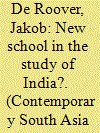| Srl | Item |
| 1 |
ID:
167249


|
|
|
|
|
| Summary/Abstract |
By arguing that a new ‘School’ is crystallising in the study of India, Deborah Sutton (2018, “So called caste: S. N. Balagangadhara, the Ghent School and the Politics of grievance.” Contemporary South Asia 26 (3): 336–349) has brought to the surface phenomena that are typical of any encounter between competing research traditions. Some difficulties of understanding are caused by conceptual change: in the dominant research tradition, ‘Hinduism’ and ‘the caste system’ refer to structures that exist in Indian society; in the research programme developed by Balagangadhara, these terms designate experiential entities embedded in a western cultural experience of India. This conceptual divide also extends to the empirical: because the study of caste and Hinduism is collapsing under the weight of accumulated anomalies, certain problems are crucial to the alternative theorising of the Ghent School, whereas they seem irrelevant to the dominant tradition. Sutton engages in the polemics characteristic of confrontations between competing research traditions. She distorts and domesticates unfamiliar ideas from this School by mapping them onto notions familiar to her. Consequently, she confuses Balagangadhara’s hypotheses about colonial consciousness with hackneyed stories about ‘Orientalism’. The article concludes with a puzzle: Why does Sutton recognise a group of researchers as a new School, while trying to dismiss them as ‘acolytes’ who reproduce the ‘mantras’ and ‘dogmas’ of an Indian thinker?
|
|
|
|
|
|
|
|
|
|
|
|
|
|
|
|
| 2 |
ID:
161155


|
|
|
|
|
| Summary/Abstract |
This article is concerned with the small but coherent lobby of political scholarship that has emerged from a lineage of research supervision which centres on the charisma and ideas of S. N. Balagangadhara, a philosopher from the Centre for the Comparative Science of Cultures (Vergelijkende Cultuurwetenschap) at the University of Ghent. In particular, it examines the deployment of his ideas in a spate of recent scholarly and social media declarations that reject the existence of caste and, by extension, caste discrimination. This scholarship – characterised by circular reasoning, self-referencing and a poverty of rigour – has established a modest, if contentious and poorly reviewed, presence in academic spheres of dissemination. The ‘Ghent School’ describes a group of scholars who rely conspicuously on Balagangadhara’s concept of ‘colonial consciousness’, a crude derivative of Said’s thesis of Orientalism. The Ghent School maintain that all extant scholarship on Hinduism, secularism and caste represents an endurance of colonial distortions that act to defame India as a nation. This politics of affront finds considerable traction in diasporic contexts but has little, if any, resonance when mapped against the far more complex politics of caste in India.
|
|
|
|
|
|
|
|
|
|
|
|
|
|
|
|